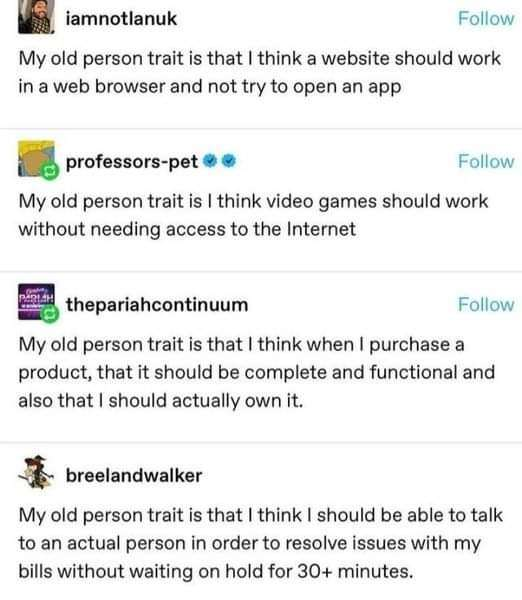this post was submitted on 31 Mar 2024
1058 points (98.3% liked)
tumblr
3594 readers
498 users here now
Welcome to /c/tumblr, a place for all your tumblr screenshots and news.
Our Rules:
-
Keep it civil. We're all people here. Be respectful to one another.
-
No sexism, racism, homophobia, transphobia or any other flavor of bigotry. I should not need to explain this one.
-
Must be tumblr related. This one is kind of a given.
-
Try not to repost anything posted within the past month. Beyond that, go for it. Not everyone is on every site all the time.
-
No unnecessary negativity. Just because you don't like a thing doesn't mean that you need to spend the entire comment section complaining about said thing. Just downvote and move on.
Sister Communities:
-
/c/[email protected] - Star Trek chat, memes and shitposts
-
/c/[email protected] - General memes
founded 2 years ago
MODERATORS
you are viewing a single comment's thread
view the rest of the comments
view the rest of the comments

The idea is it's a litmus test for tech literacy. It doesn't have to be relevant to the daily browsing experience, it would just ensure that everyone on the internet knows what things like cookies are and what they actually do.
It's like not bothering to learn what an engine is before learning to drive a car.
The problem with your examples is that they do affect the user's ability to use the tech in question, and the same can't be said for HTTP. If there isn't a clear benefit to knowing something, then making it a requirement is just an artificial gate and an unnecessary burden. For example, pharmacists don't withhold your prescriptions because you don't understand a drug's mechanism of action, but they do make sure you understand the risks and any drug interactions. Airlines don't force you to learn how their planes create lift, but they do educate you on what to do in an emergency. I don't see why tech should be any different from those 2.